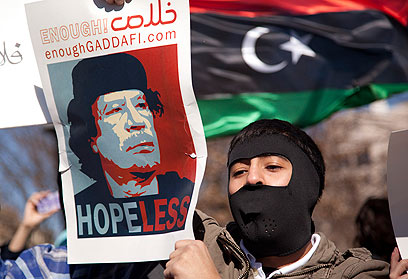Clashes between supporters and opponents of Moammar Gadhafi were reported in Tripoli, Libya's capital, Sunday as the Libyan leader attempted to crush a spreading uprising against his 40-year rule.
Witnesses in Libya's second-largest city, Benghazi, said Sunday that some military personnel there had switched sides and joined anti-government demonstrators in the city, where security forces have reportedly shot and killed scores of protesters over the past few days.
The U.S.-based Human Rights Watch says 173 people have died in three days of unrest in Libya. Hospital officials in Benghazi said the crackdown in that city alone has killed at least 200 people and wounded hundreds of others.
One of Mr. Gadhafi sons, Saif al-Islam Gadhafi, appeared on Libyan state television late Sunday. He warned of “rivers of blood” in a civil war that would consume the country's oil wealth and see the return of colonial powers if the situation slipped further out of control.
Gadhafi promised dialogue on the Libyan constitution and a return to “local government,” imploring his countrymen not to “divide the country.” Accusing Libyan exiles, people “on drugs” and criminals of fomenting the violence, he repeatedly said Libya was “not Egypt or Tunisia” – neighboring countries whose strongmen were swept from power in recent weeks. He described Libya as a tribal society awash in weapons that would quickly descend into civil war.
Meanwhile, in the first-reported defection from Mr. Gadhafi's regime, Libya's representative to the Arab League quit to protest the harsh crackdown against the demonstrators. Libya currently holds the rotating presidency of the 22-nation group.
There was no independent confirmation of Libyan witnesses' accounts of the violence, as the government has barred local and foreign journalists from covering the unrest.
Meanwhile, the Arabic satellite channel Al Jazeera says the Libyan government has blocked Al Jazeera's television signal in the country. The channel's coverage has played a big role in protests across the region.
Libyan authorities also cut off Internet services in the country Saturday, denying cyber activists a key tool to mobilize demonstrators.
Mr. Gadhafi has tried to defuse the protests by doubling the salaries of state employees and releasing 110 suspected Islamic militants. He took power in a 1969 coup and has built his rule on a cult of personality and a network of family and tribal alliances.
